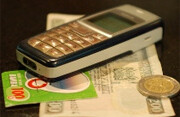In an all-too-familiar story, newly installed United States Treasury Secretary Timothy Geithner's confirmation was delayed by revelations of irregularities in his tax history.
The list of cabinet-level nominees torpedoed by nanny and tax issues includes Zoe Baird, Kimba Wood, and Bernard Kerik.
Some errors, it seems likely, were unintentional; others may have been due to laziness or greed. Regardless, our cash economy and voluntary reporting system facilitate such "oversights." In 2007, the IRS estimated the "tax gap" to be $345 billion per year, mostly attributable to underreporting of income.
But there is a solution to this problem. Widespread adoption of electronic forms of payment would go a long way toward eliminating small-scale tax evasion related to everyday transactions.
Once the stuff of science fiction, technologies like direct deposit, smart cards, and cell phone payments have gained the public trust. It's time to make the leap to a cashless world.
Some will balk at the thought of giving up their cold, hard cash. But what is money after all? It is merely a tool created by man to smooth economic transaction. To economists, anything that acts as a medium of exchange, a store of value, and a unit of account, is money.
"Money is a living creature of the market and its form changes to facilitate commercial transactions in an ever more efficient, convenient, and safe manner," according to Washburn University law professor Ali Khan. "The market is now headed toward creating 'e-money.'"
This will certainly generate howls from the "real money" crowd (think of Ron Paul and his supporters) who still lament the loss of the gold standard. But these days all money is "fiat money," acceptable as payment merely because some financial authority deems it so.
At one time or another, money has come in the form of gold, silver, cattle, sea shells, rice, salt, cigarettes, and paper. In theory, anything can serve as money—even digital bytes.
In his new book, The Ascent of Money, historian Niall Ferguson argues that the intangibility of money is in fact its most defining feature. "Money is not metal," he writes. "It is trust inscribed." And without it, "the economic history of the world would scarcely have got off the ground."
Promotion and development of electronic financial infrastructure is essential, but if a post-cash society is to succeed at all, trust will have to be at its heart.
"The more complex the transaction the more trust is needed to sustain the transaction," wrote Robert Shiller recently in the Wall Street Journal. Electronic payments are extremely complex transactions. Consumers will need guarantees of security. Governments must develop the capacity to safeguard transparency, promote simplicity, and ensure compatibility across borders. Attentive regulation of the money supply must be a priority.
A cashless society, of course, has its downsides. Technology failure, fraud, identity theft, and the loss of simple human interaction all present difficult challenges. Counterfeiters will undoubtedly view a new era of electronic money as an invitation to innovate. Criminals and tax cheats will surely find new ways to hide income, defraud investors, and launder money.
But a total digitization of our payment systems could eliminate the temptation to fudge in smaller quantities—narrowing the tax gap and ensuring the swift confirmation of cabinet officials. At the very least, it would make the financial detective work of regulators and prosecutors a little easier.
Despite the panicked talk in recent months about the viability of our financial system, the United States remains the world's indispensable economy. A nudge toward electronic money here may be just the jolt the world economy needs.
If we build it, the rest will certainly come.




